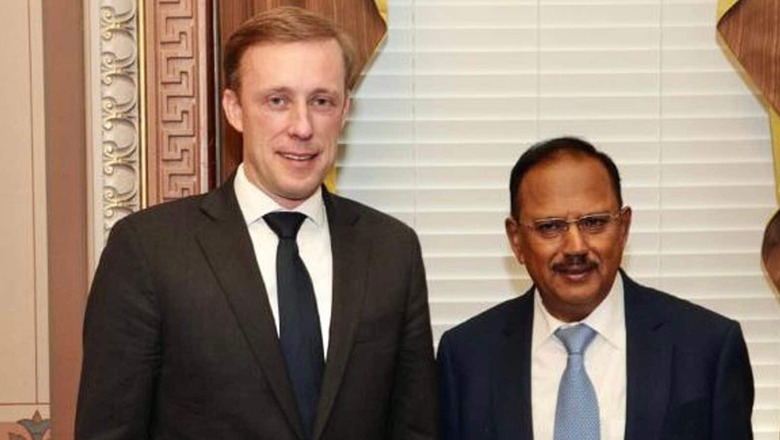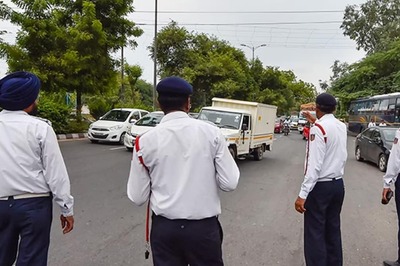
views
National Security Advisor Ajit Doval and his American counterpart Jake Sullivan earlier this week led the inaugural meeting of the US-India initiative on Critical and Emerging Technology (iCET) in Washington DC. The iCET was announced in May 2022 following a meeting between Prime Minister Narendra Modi and US President Joe Biden.
Doval was accompanied by Indian envoy to the US, Taranjit Singh Sandhu and several highly-placed officials from the Government of India as well as the chairman of the Indian Space Research Organisation.
Sullivan was also accompanied by highly-placed officials from the US government and also the administrator of the National Aeronautics and Space Administration.
Transforming vision into action! NSAs Ajit Doval & Jake Sullivan formally launched U.S.-India Initiative on Critical and Emerging Technologies(iCET).Announced by @narendramodi & @POTUS,iCET reflects???????????????? conv.of strategic,commercial & scientific approaches in field of technology pic.twitter.com/XvXHCdCGqk
— India in USA (@IndianEmbassyUS) January 31, 2023
Doval, Sullivan and the highly-placed officials who participated in the meeting discussed opportunities where both countries can extend their cooperation in critical and emerging technologies.
The officials identified fields of biotechnology, advanced materials and rare earth processing technology as areas for future cooperation.
India and the US will also work together to explore projects related to jet engines, munition related technologies and other systems under a new bilateral Defense Industrial Cooperation Roadmap.
The United States will review the application from General Electric to jointly produce jet engines that could power jet aircraft operated and produced indigenously by India.
NSA Ajit Doval and US NSA Jake Sullivan @JakeSullivan46 reviewed ongoing bilateral initiatives, the upcoming launch of Initiative on Critical and Emerging Technologies (iCET) and shared assessments of major global and regional developments during a productive meeting. pic.twitter.com/85PwoCqTBj— India in USA (@IndianEmbassyUS) January 31, 2023
Another important aspect of the meeting was the desire to build resilient semiconductor supply chains.
The US is perturbed by China’s advancements in the semiconductor industry and has announced several measures to counter its growth because China can use its chip industry to control global supply chains, posing national security and military threats to other nations.
The highly-placed officials discussed how, with support from the US, India can strengthen its role within the global semiconductor value chain. India and the US will collaborate to develop semiconductor design, manufacturing, and fabrication ecosystems in India.
Deepening bilateral cooperation in S&TDelighted to sign the Implementation Arrangement between ???????? Dept of Science & Tech @IndiaDST and ????????National Science Foundation @NSF, along with my good friend Panch @DrPanch and in the presence of NSAs Ajit Doval and @JakeSullivan46 pic.twitter.com/3LuucECMv0
— Taranjit Singh Sandhu (@SandhuTaranjitS) January 31, 2023
The US and India will work together to promote the development of a skilled workforce which will support global semiconductor supply chains.
A task force has been organized by the US Semiconductor Industry Association (SIA) in partnership with the India Electronics Semiconductor Association (IESA) with participation from the Government of India Semiconductor Mission to develop a “readiness assessment” to identify near-term industry opportunities and facilitate longer-term strategic development of complementary semiconductor ecosystems.
The officials also discussed the prospect of deepening connectivity across innovation ecosystems of both countries. Sullivan and Doval, both noted that India and the US should establish ‘innovation bridges’ in key sectors and also through expos, hackathons, and pitch sessions.
Both nations underlined the importance of resolving issues related to regulatory barriers and business and talent mobility in both countries through a standing mechanism under iCET as well.
Furthermore, both nations have agreed to further increase cooperation between governments, industry and academia through the following steps:
- India and US will extend their collaboration in the fields of artificial intelligence, quantum technologies and advanced wireless via new implementation arrangement which will be signed between US’ National Science Foundation and Indian science agencies
- To further facilitate research and industry collaboration, an Indo-US Quantum Coordination Mechanism will be established with participation from industry, academia and government
- Both countries will develop common standards and benchmarks for trustworthy AI and ensure that these standards and benchmarks are aligned with democratic values, the press release from the White House said.
- India and the US will also collaborate on High Performance Computing (HPC) and the US Congress will lower barriers to US exports of HPC technology and source code to India.
Read all the Latest News here



















Comments
0 comment